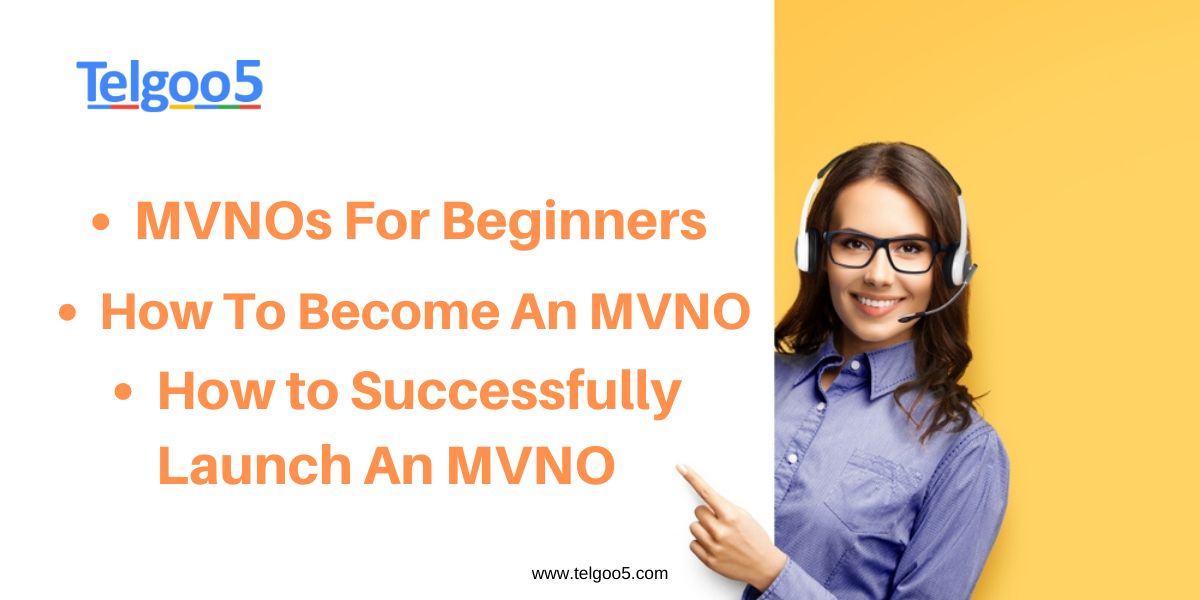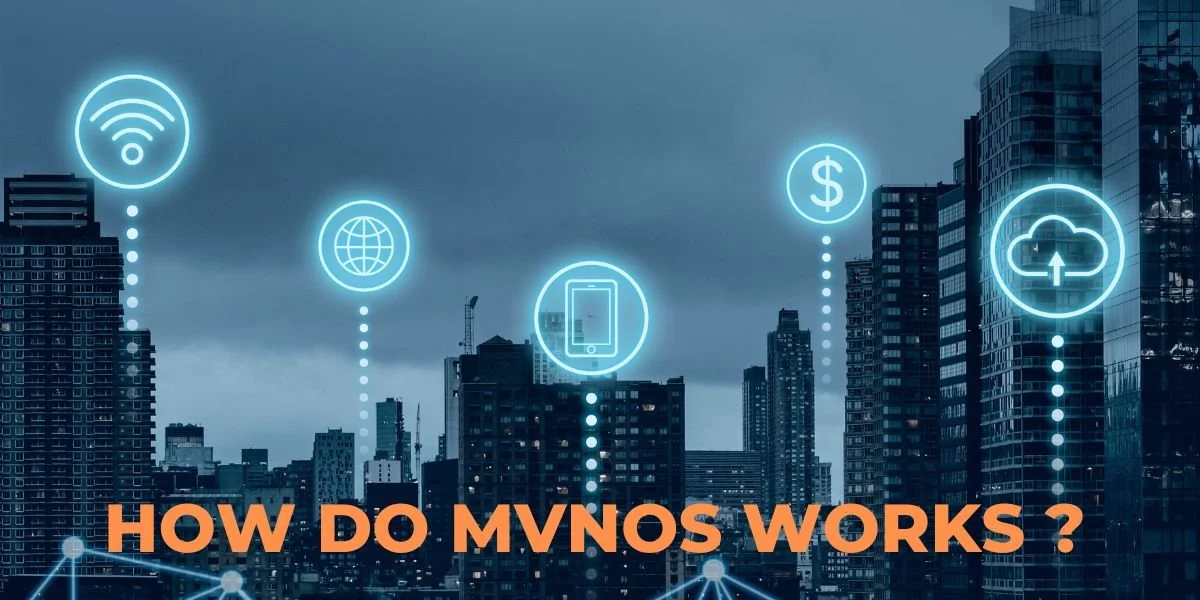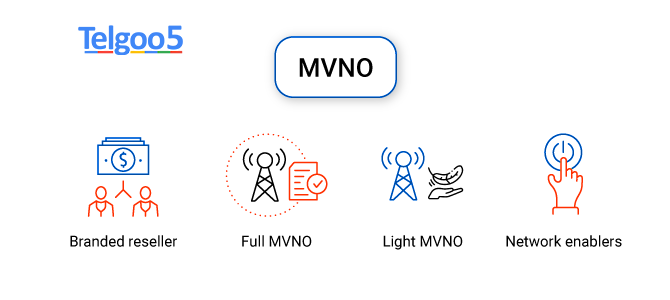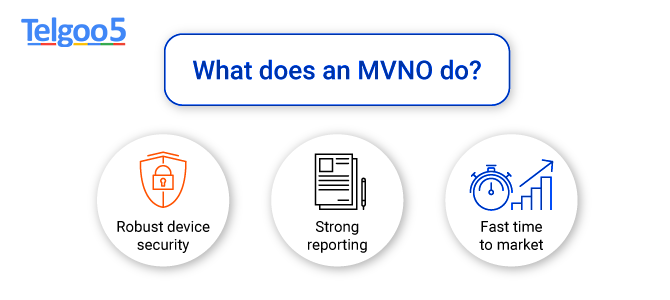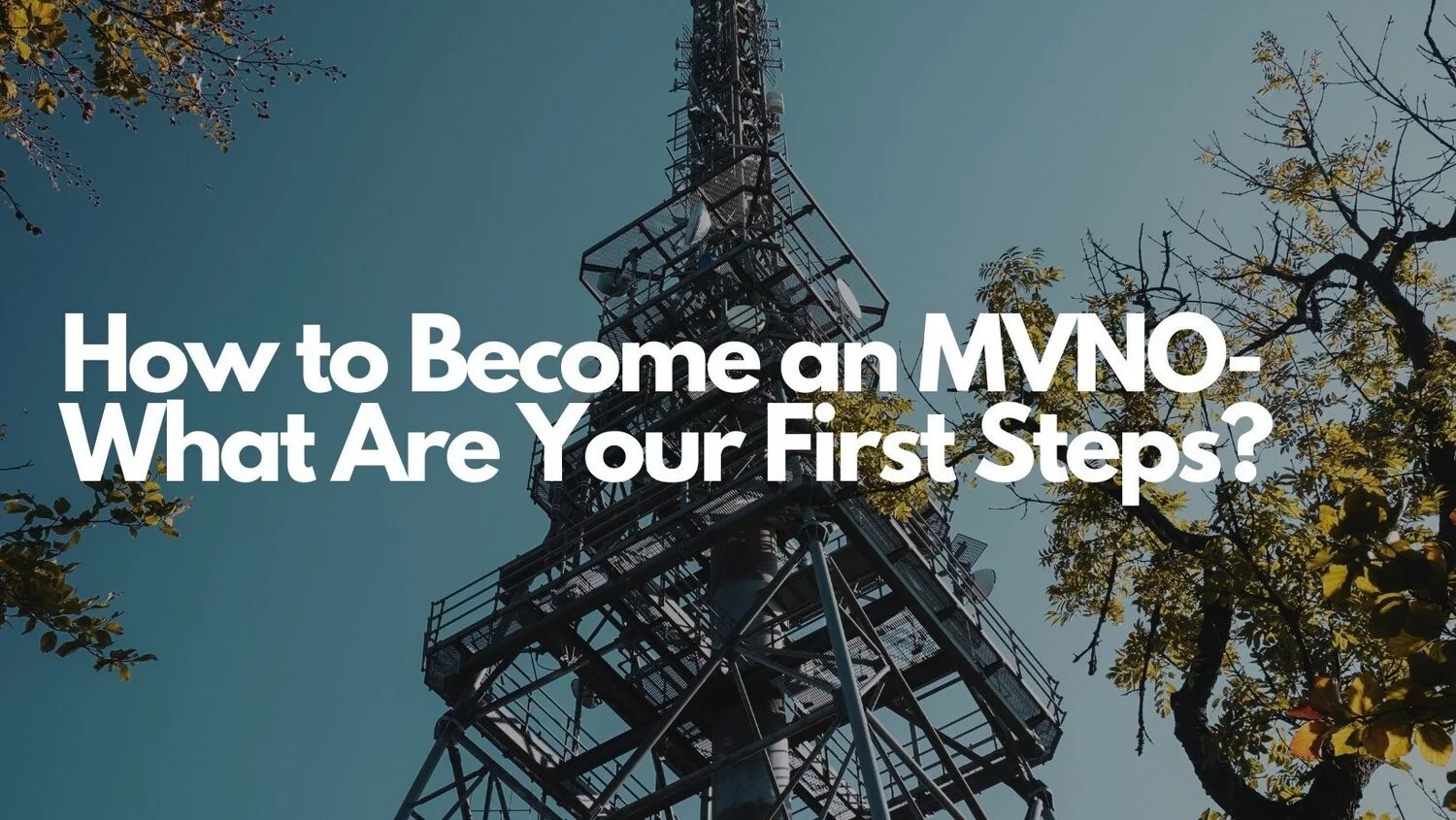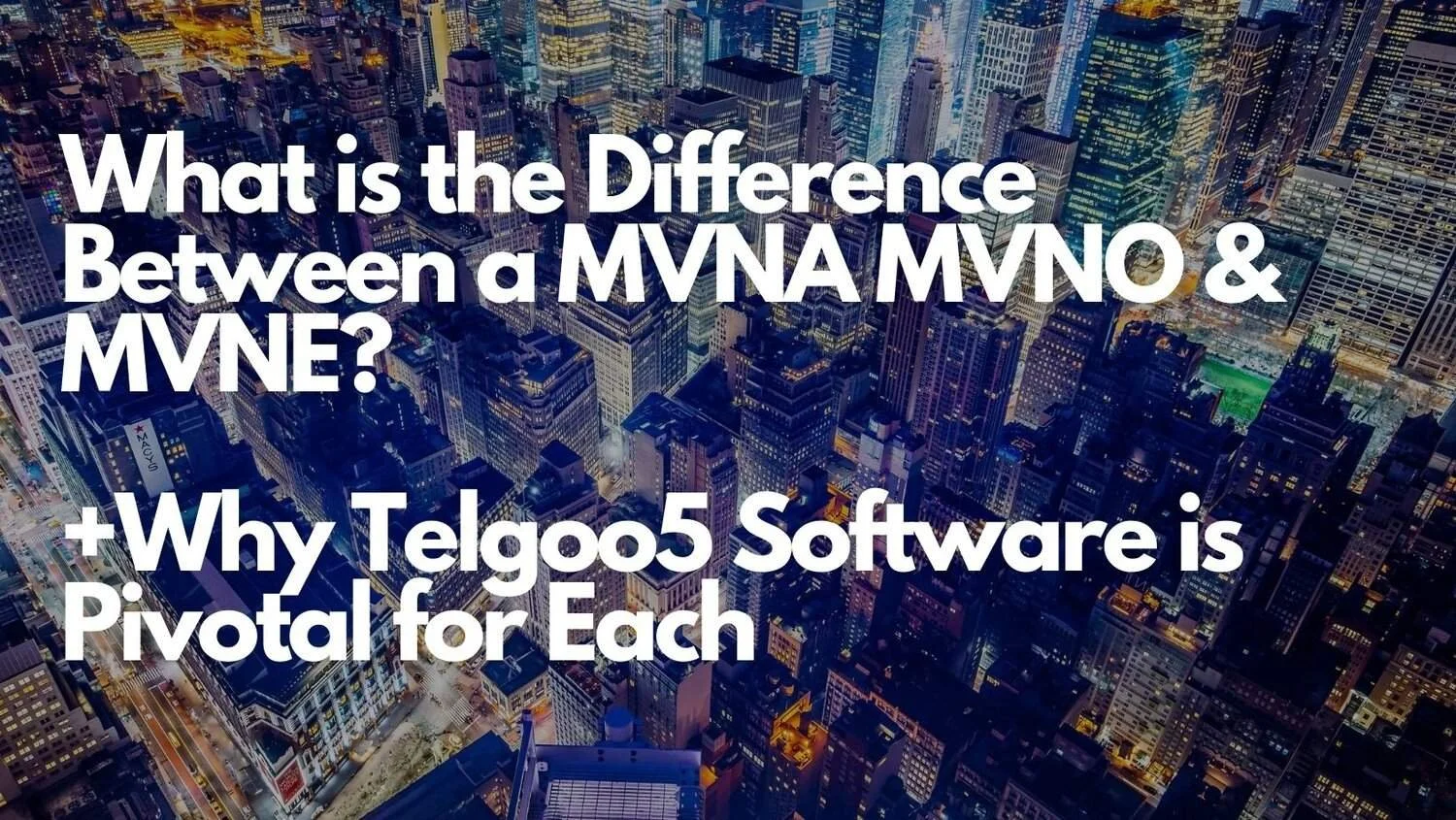MVNOs for Beginners - How to become an MVNO - How to successfully launch an MVNO
An MVNO is a company that provides mobile services to customers without owning the underlying network infrastructure. Instead, an MVNO partners with a network operator to provide mobile services using the operator's network. An MVNE, on the other hand, provides the technical infrastructure and services needed to operate an MVNO.
MVNO / MVNE Billing
MVNO (Mobile Virtual Network Operator) and MVNE (Mobile Virtual Network Enabler) billing involves the billing and revenue management of mobile services for virtual network operators. This includes managing customer accounts, charging for services, and generating invoices.
An MVNO is a company that provides mobile services to customers without owning the underlying network infrastructure. Instead, an MVNO partners with a network operator to provide mobile services using the operator's network. An MVNE, on the other hand, provides the technical infrastructure and services needed to operate an MVNO.
An MVNO billing system typically includes the following components:
1. Customer management: This includes managing customer accounts, customer data, and customer support.
2. Service provisioning: This involves setting up and configuring customer services, such as voice, messaging, and data services.
3. Usage tracking: This involves tracking customer usage of mobile services and generating usage reports.
4. Rating and charging: This involves calculating charges for mobile services based on usage and customer billing plans.
5. Invoicing and payment: This involves generating invoices for customers and processing payments.
MVNO and MVNE Billing Systems are typically integrated with the network operator's billing and revenue management system to ensure accurate and timely billing for services. These systems may also integrate with other systems, such as customer relationship management (CRM) and financial management systems, to provide a comprehensive view of customer interactions and financial transactions.
Effective MVNO and MVNE billing is critical to the success of virtual network operators. By partnering with reliable billing and revenue management service providers, MVNOs and MVNEs can improve customer satisfaction, reduce churn, and increase profitability.
MVNOs for Beginners
MVNOs (Mobile Virtual Network Operators) are companies that offer mobile phone services to customers without owning a physical mobile network infrastructure. Instead, they partner with established mobile network operators (MNOs) to use their network infrastructure and provide mobile services to customers.
Here are some basics to know about MVNOs:
1. Business Model: MVNOs operate on a wholesale model where they purchase network capacity and services from MNOs and then resell them to customers. MVNOs do not own their network infrastructure, but they do own their branding, pricing, and marketing strategies.
2. Target Market: MVNOs can target specific customer segments, such as ethnic or niche markets, with customized services and pricing plans.
3. Cost Savings: MVNOs can offer competitive pricing to customers because they do not have to invest in expensive network infrastructure. However, they still have to pay for the network capacity they purchase from the MNOs.
4. MVNO Types: There are different Types of MVNOs, including Full MVNOs that have complete control over their services, and light MVNOs that have limited control and rely more on the host operator's systems.
5. MVNO Benefits: MVNOs offer several benefits to customers, including competitive pricing, customized services, and flexible plans. They also provide more options in the mobile services market and can offer superior customer service due to their more focused and specialized nature.
6. Challenges: Some challenges faced by MVNOs include the need to negotiate favorable contracts with MNOs, maintain adequate network capacity, and provide differentiated services to stand out in a crowded market.
Starting an MVNO can be a complex process, but it can be a profitable business model for those who do it successfully. It's important to research the market and the competition, develop a sound business plan, and work with experienced partners to launch and grow an MVNO.
How to become an MVNO
Becoming an MVNO (Mobile Virtual Network Operator) requires several steps, including:
1. Conduct market research: Identify the target market for your MVNO and assess the competition in the area. Determine what kind of services and pricing plans will appeal to your target audience.
2. Develop a business plan: Develop a comprehensive business plan that includes your target market, marketing strategy, operational strategy, and financial projections. Your business plan should also include how you plan to differentiate your services from competitors.
3. Choose a host operator: Identify a host operator with a network that meets your needs in terms of coverage and services. Negotiate a contract with the host operator that outlines the terms of the partnership, including network access, pricing, and service-level agreements.
4. Obtain regulatory approvals: Depending on your location, you may need to obtain regulatory approvals before launching your MVNO. Research the legal requirements in your jurisdiction and obtain the necessary licenses and approvals.
5. Develop a brand identity: Develop a strong brand identity that differentiates your MVNO from competitors and resonates with your target market. Your brand identity should be consistent across all marketing and communication channels.
6. Build your network infrastructure: Set up the necessary systems for billing, customer management, and network monitoring. Choose a billing and customer management system that integrates with the host operator's systems.
7. Launch your MVNO: Launch your MVNO and market your services to your target audience. Monitor your operations and adjust your strategies as needed.
Becoming an MVNO can be a complex process, but it can be a profitable business model for those who do it successfully. It's important to seek expert advice and guidance at every step of the process to increase your chances of success.
How to successfully launch an MVNO
Launching an MVNO (Mobile Virtual Network Operator) can be a complex process, but there are several key steps you can take to increase your chances of success. Here are some tips to successfully launch an MVNO:
1. Develop a solid business plan: Your business plan should include a clear strategy for how you will differentiate your services, target your customers, and generate revenue. It should also outline your marketing and operational strategies, as well as your financial projections.
2. Choose the right host operator: Your success as an MVNO depends on having a reliable and high-quality network operator partner. Research your options and choose a host operator that offers a network that meets your needs, competitive pricing, and excellent customer service.
3. Choose the right technology partners: Choose technology partners that offer billing and customer management systems that integrate with your host operator's systems. This will help you manage your operations more efficiently and provide better customer service.
4. Develop a strong brand identity: Your brand identity should be unique and resonate with your target audience. Develop a clear brand message and communicate it consistently across all marketing and communication channels.
5. Launch with attractive offers: Launch with attractive pricing plans and promotional offers that will help you attract and retain customers. You can offer discounts, free trials, or other incentives to encourage customers to sign up.
6. Provide excellent customer service: Focus on providing exceptional customer service to differentiate your MVNO from competitors. Train your customer service representatives to handle customer inquiries and complaints promptly and effectively.
7. Monitor and adjust your strategies: Monitor your operations closely and adjust your strategies as needed. Use analytics and customer feedback to identify areas for improvement and make changes to improve your services and customer experience.
Launching an MVNO can be a challenging process, but by following these tips, you can increase your chances of success and create a profitable business.
How Do MVNOs Work?
Mobile Virtual Network Operators (MVNOs) are companies that offer mobile services, such as voice and data plans, without owning the underlying network infrastructure. Instead, MVNOs lease network capacity from one or more mobile network operators (MNOs), such as AT&T, Verizon, or T-Mobile, and then rebrand and sell that capacity to their customers. In this way, MVNOs are able to offer competitive pricing and tailored services without the significant investments required to build and maintain their own networks.
Three criteria are commonly used to classify MVNOs
Yes, MVNOs are often classified based on three criteria:
Business Model: MVNOs can operate as service resellers, which means they simply resell the services of a single MNO, or as full MVNOs, which have more control over the services they offer, including pricing, branding, and customer management.
Customer Segment: MVNOs can target specific customer segments, such as budget-conscious consumers, business customers, or ethnic groups, and tailor their services accordingly.
Service Offering: MVNOs can focus on offering specific services, such as voice, data, or both. Some MVNOs also offer value-added services, such as international calling or roaming, that are not typically included in traditional mobile plans.
By using these criteria, MVNOs can differentiate themselves from the traditional MNOs and offer unique and customized mobile services to their customers.
Mobile Virtual Network Operators offer the following connectivity services
Mobile Virtual Network Operators (MVNOs) typically offer the following connectivity services to their customers:
Voice Calls: MVNOs offer voice call services, allowing customers to make and receive calls using their mobile devices.
Text Messaging: MVNOs also offer text messaging services, allowing customers to send and receive text messages.
Mobile Data: MVNOs offer mobile data services, which allow customers to use the internet, browse websites, and use data-intensive applications, such as streaming music or video.
Mobile Broadband: Some MVNOs offer mobile broadband services, which provide high-speed internet connectivity for laptops and other devices using a mobile data connection.
International Roaming: Some MVNOs offer international roaming services, allowing customers to use their mobile devices while traveling abroad.
Mobile Hotspot: MVNOs also offer mobile hotspot services, which allow customers to share their mobile data connection with other devices.
By offering these services, MVNOs provide a comprehensive mobile experience for their customers and offer alternative options to traditional mobile services.
Now that we know how MVNOs work and the services they provide, let us look at a few examples of Mobile Virtual Network Operators
Summary:
Mobile Virtual Network Operators (MVNOs) are companies that offer mobile services, such as voice and data plans, without owning the underlying network infrastructure. They lease network capacity from one or more mobile network operators (MNOs) and rebrand and sell that capacity to their customers.
MVNOs are classified based on their business model, customer segment, and service offering. They offer a variety of connectivity services, including voice calls, text messaging, mobile data, mobile broadband, international roaming, and mobile hotspot services. MVNOs provide a cost-effective and flexible alternative to traditional mobile services and target specific customer segments with tailored services. Examples of MVNOs include Boost Mobile, Virgin Mobile, TracFone, Google Fi, and Metro by T-Mobile.
Benefits and Market Value of MVNO For Telecom Operators?
In terms of market value, MVNOs have become a significant player in the telecommunications industry and are estimated to generate billions of dollars in revenue each year. The market value of MVNOs is expected to continue to grow as more consumers seek more cost-effective and customizable mobile services.
Mobile Virtual Network Operators (MVNOs) provide several benefits to telecom operators:
Increased market reach: MVNOs help telecom operators reach new markets and demographics, especially those who may have been previously underserved.
Reduced capital expenditure: MVNOs typically pay for their own network infrastructure, reducing the capital expenditure required by telecom operators.
Increased revenue: MVNOs generate additional revenue streams for telecom operators by offering new services and pricing plans to customers.
Brand differentiation: MVNOs can help telecom operators differentiate their brand and offer unique value propositions to customers.
In terms of market value, MVNOs have become a significant player in the telecommunications industry and are estimated to generate billions of dollars in revenue each year. The market value of MVNOs is expected to continue to grow as more consumers seek more cost-effective and customizable mobile services.
MVNO Market Evolution
The MVNO market has evolved significantly since its inception. Here are some key developments in the MVNO market evolution:
Early Adoption: MVNOs were first introduced in Europe in the late 1990s, offering low-cost mobile services to consumers.
Expansion into new markets: MVNOs have since expanded into other regions, including North America, Asia, and Australia.
Diversification of services: MVNOs have diversified their services beyond basic voice and text services, offering data plans, mobile broadband, and mobile financial services.
Increased competition: The MVNO market has become increasingly competitive, with new entrants offering innovative services and pricing plans to attract customers.
Partnership with MNOs: MVNOs have formed partnerships with Mobile Network Operators (MNOs) to leverage their network infrastructure, providing cost-effective and scalable services to customers.
Emergence of digital MVNOs: Digital MVNOs have emerged, offering mobile services exclusively through online channels, providing customers with a convenient and seamless experience.
5G MVNOs: With the rollout of 5G technology, MVNOs are expected to play a significant role in providing 5G services to customers, leveraging the network infrastructure of MNOs.
Overall, the MVNO market has evolved to meet the changing needs and demands of customers, providing a wider range of services and more cost-effective mobile solutions.
Challenges in the MVNO Business
The MVNO business model presents several challenges that must be overcome for success:
Dependence on MNOs: MVNOs rely on Mobile Network Operators (MNOs) for network infrastructure, making them vulnerable to changes in MNO policies and prices.
Competition with MNOs: MVNOs compete with MNOs for customers, making it difficult to differentiate their services and pricing plans.
Complex pricing models: MVNOs must develop complex pricing models that take into account the cost of network usage, customer acquisition, and marketing expenses.
Limited control over network quality: MVNOs have limited control over network quality, which can impact customer satisfaction and loyalty.
Marketing challenges: MVNOs must develop effective marketing strategies to attract and retain customers in a highly competitive market.
Regulation and compliance: MVNOs must comply with a wide range of regulatory requirements, including privacy, data protection, and consumer protection laws.
Capital investment: MVNOs require significant capital investment to build out their network infrastructure and develop their brand.
Overall, MVNOs must overcome these challenges to establish a successful and sustainable business. This requires a combination of effective marketing strategies, a strong focus on customer service, and careful financial management.
What is a mobile virtual network operator (MVNO)?
A mobile virtual network operator (MVNO) is a telecommunications service provider that offers mobile phone services, but does not own the infrastructure to provide them. Instead, MVNOs purchase network services wholesale from one or more mobile network operators and then rebrand and sell these services to customers under their own name.
A mobile virtual network operator (MVNO) is a telecommunications service provider that offers mobile phone services, but does not own the infrastructure to provide them. Instead, MVNOs purchase network services wholesale from one or more mobile network operators and then rebrand and sell these services to customers under their own name. This allows MVNOs to offer competitive mobile phone plans and services without having to invest in the expensive infrastructure required to support a mobile network.
What makes a mobile virtual networks operator unique?
A mobile virtual network operator (MVNO) is unique in the following ways:
Rebranding: MVNOs purchase network services from mobile network operators and rebrand the services under their own name, creating a unique customer experience.
Independent pricing and plans: MVNOs have the flexibility to offer their own pricing and plans, separate from the mobile network operators they purchase services from.
Targeted demographics: MVNOs often target specific demographics, such as budget-conscious consumers, seniors, or specific ethnic groups, with tailored services and plans.
Reduced infrastructure costs: MVNOs do not need to invest in the infrastructure required to support a mobile network, reducing their overhead costs and allowing them to offer more competitive prices.
Faster service and product innovation: MVNOs can be more agile and flexible in introducing new services and products, as they do not need to invest in upgrading their own infrastructure.
These unique characteristics make MVNOs a popular alternative for consumers looking for more affordable and customized mobile phone services.
What does an MVNO do?
A mobile virtual network operator (MVNO) provides mobile phone services to consumers, but does not own the infrastructure to support these services. Instead, an MVNO purchases network services wholesale from one or more mobile network operators and then rebrands and sells these services to its customers under its own name. An MVNO is responsible for the following activities:
1. Marketing and customer acquisition: MVNOs market and sell their services to their target customers.
2. Customer service and support: MVNOs handle customer service and support for their subscribers, including billing, technical support, and troubleshooting.
3. Network management: MVNOs manage the network services they purchase from mobile network operators to ensure reliable and high-quality coverage for their customers.
4. Plan and pricing management: MVNOs set their own pricing and plans for their customers, offering a unique and customized experience.
5. Mobile phone and device sales: MVNOs may also sell mobile phones and devices to their customers, either directly or through partnerships with manufacturers.
In summary, MVNOs are responsible for the end-to-end customer experience, from marketing and customer acquisition to customer service and support, all while leveraging the network infrastructure of mobile network operators.
Why do mobile network operators need MVNO?
Mobile network operators partner with mobile virtual network operators (MVNOs) for several reasons, including:
1. Increased revenue: MVNOs purchase network services wholesale from mobile network operators and rebrand and sell these services to their own customers. This provides mobile network operators with additional revenue from the sale of network services to MVNOs.
2. Customer acquisition and retention: MVNOs can target specific customer segments, such as budget-conscious consumers, seniors, or specific ethnic groups, and help mobile network operators reach and retain these customers.
3. Better use of excess network capacity: Mobile network operators often have excess network capacity, and partnering with MVNOs helps them make better use of this capacity, improving their overall utilization and efficiency.
4. Increased brand exposure: MVNOs can promote and advertise the mobile network operator's brand, increasing its visibility and exposure in the market.
5. Innovation: MVNOs can introduce new services and products more quickly and easily than mobile network operators, providing a way for the latter to stay innovative and competitive in the market.
Overall, MVNO partnerships can help mobile network operators increase revenue, reach new customers, improve network utilization, increase brand exposure, and drive innovation.
What kind of MVNOs are there?
There are several types of mobile virtual network operators (MVNOs), including:
1. Discount MVNOs: These MVNOs target budget-conscious consumers with low-priced plans and services, often using the network of a single mobile network operator.
2. Niche MVNOs: These MVNOs target specific customer segments, such as seniors, ethnic groups, or travelers, with tailored services and plans.
3. Full-service MVNOs: These MVNOs offer a full range of mobile phone services, including voice, data, and text, and often partner with multiple mobile network operators to ensure broad coverage.
4. Data-focused MVNOs: These MVNOs focus on providing high-speed data services, such as mobile internet and hotspot services, to their customers.
5. Branded MVNOs: These MVNOs are often owned by large brands, such as supermarkets or cable companies, and offer mobile phone services under their own brand name.
6. Enterprise MVNOs: These MVNOs cater to the needs of businesses and organizations, offering customized mobile phone plans and services for their employees.
Each type of MVNO offers a unique set of services and plans, targeting different customer segments and providing a competitive alternative to traditional mobile network operators.
What do MVNOs need to be competitive?
To be competitive, MVNOs (Mobile Virtual Network Operators) need the following key elements:
1. Cost-effective network access: MVNOs need to secure a reliable and cost-effective access to a mobile network from a host carrier, often at wholesale rates.
2. Unique Value Proposition: MVNOs need to differentiate themselves from other providers by offering a unique value proposition to their customers, such as lower prices, specialized services or targeted customer segments.
3. Strong Brand: MVNOs need to have a strong brand that resonates with their target customers, and effective marketing to reach and retain them.
4. Good customer service: MVNOs need to provide high-quality customer service to ensure customer satisfaction and loyalty.
5. Flexible business model: MVNOs need to have the ability to quickly adapt to changing market conditions and customer demands, with a flexible business model that allows them to offer new services and packages as needed.
6. Effective back-end operations: MVNOs need to have an effective back-end operation, including billing, customer service, and network management, to support their customer-facing activities and ensure a seamless customer experience.
The Relationship Between MVNOs and MVNEs | Full Guide
Telgoo5 offers both MVNO and MVNE services to small and medium-sized telecom companies. Contact Telgoo5 today to learn more.
To create and run a successful MVNO business, you have to take care of several responsibilities. Offer personalized services to users. Execute effective marketing strategies. Keep up with the contract with your MNO. Data analysis. And so on.
For most small to medium-sized MVNOs, these duties are too much to handle. They have two choices. Either work with many third-party companies and essentially endanger customer data, or hire an MVNE to take care of all administrative duties and focus on selling personalized offers to customers.
We will break down what MVNOs and MVNEs are and the relationship between the two. Let's get started.
What Is an MVNO?
An MVNO is a network operator who buys bulk telecom services from an MNO and resells them to users. An MVNO is usually focused on providing very personalized and streamlined services to customers.
Verizon and T-mobile are examples of MNOs that sell network infrastructure to MVNOs like Virgin Mobile and Walmart Mobile.
Some MVNOs are extensive enough to offer the full range of telecom services from voice to data connectivity. These companies, called full MVNOs, develop their billing systems, produce their own SIM cards, and manage their charging systems.
Light MVNOs depend on the MNO to take care of connectivity. All they do is provide niche services and marketing to their audience.
What Is an MVNE?
MVNE stands for Mobile Virtual Network Enablers. These telecom companies work with MVNOs to ensure the smoothness of service. They are there to make life easier for the startup MVNO.
Remember the reason why MVNOs are in the market in the first place. They are there to provide niche and personalized services that the large MNO cannot offer its users.
An MVNO, especially a full one, has several responsibilities, including providing connectivity services, tariffs, personalized services, and customer support.
Many MVNOs cannot handle it all, so they reach out to MVNEs to help. MVNEs take care of the customer support and the administrative work for the MVNOs. This frees the MVNOs to focus on developing streamlined offers for their users.
It's common to find one MVNE working with several MVNOs.
Benefits of Working With an MVNE
1. A Reliable Online Charging System
MVNOs now use online charging systems to bill customers accurately. Online charging systems bill customers in real-time, which allows for greater transparency and an increase in customer trust.
The thing is, most MVNOs cannot invest in creating their own OCS solution. On the other hand, MVNEs have OCSs already in place.
It's cheaper and easier for the MVNO to hire an MVNE to take care of charging customers.
2. Specialized Customer Service
As an MVNO grows and acquires more customers, the need for a systematized customer service center becomes more urgent. A startup MVNO either creates a new department and hires many support reps or outsources to a third-party company.
An MVNO should outsource customer service to an MVNE because they have staff specifically trained to cater to telecom users. Hiring an MVNE to care for customer service saves an MVNO money and time.
3. Reduced Spending Costs
The MVNE takes on all the administrative duties of an MVNO, which saves the MVNO from spending money to recruit more staff and take care of billing, customer support, and data analysis.
Telgoo5 offers both MVNO and MVNE services to small and medium-sized telecom companies. Contact Telgoo5 today to learn more.
The Complete Guide to MVNOs and the Services They Provide
Telgoo5 sets up MVNOs for businesses and service centers. Feel free to browse our full range of options.
Introduction to MVNO
Think of a large Mobile Network Operator like Sprint. Sprint owns cell towers and antennas, and directly sells network connectivity to users. Then, think of a smaller network like Tello. Tello does not own network infrastructure. Instead, it buys "space" in bulk from Sprint and resells to users. Tello is an MVNO.
MVNO stands for Mobile Virtual Network Operator. MVNO is a network operator that buys access from an MNO, and then resells to consumers. The first MVNO was launched in the UK and quickly became popular because of cheaper rates and better targeting.
MVNOs are partly or fully owned by MNOs. In other words, while some MVNOs have exclusive agreements with single MNOs, others buy network access from multiple MNOs.
Different Types of Services Offered by MVNOs
The services provided by an MVNO are dependent on which kind it is. Here are the four main types of MVNOs.
Full MVNOs
The only thing that full MVNOs get from an MNO is connectivity, that is, access to network antennas. Full MVNOs develop and manage their core network infrastructure and billing systems. They manufacture their own SIM cards and manage call flows and data flows. They develop and sell network services. In addition to doing these, they also take care of customer relations and branding.
Light MVNOs
Light MVNOs have no business with managing connectivity. It's MNOs that take care of that. Light MVNOs are only concerned about their customers. They throw weight behind customer relations, branding, niche services, and marketing. Light MVNOs are perfect for service and branding-oriented businesses looking to service an underserved niche.
Branded Resellers
Branded Resellers, also called reseller MVNOs, operate by selling access to an already existing customer base. What they do is sign a contract with an MNO, either use the same brand or rebrand to a new MVNO, and then resell the MNO services to their audience.
The main thing branded resellers do is sales, distribution, and marketing. The MNO remains in full control of network services and tariffs, while the reseller MVNO worries about selling to more users.
Is it Worth Switching to an MVNO?
Fewer service costs
The main attraction of MVNOs is that they offer lower-cost services. They buy from the MNOs and resell at cheaper prices.
It works this way. An MNO often has a broad customer base. In trying to offer a solid service to everyone in their base, MNOs have services that are broad, inflexible, underused, and overpaid. MVNOs focus on a smaller niche, customize their offerings, and so sell at cheaper prices.
Customized services
MVNOs focus on a smaller number of users and are concerned with segmenting their customer base to offer personalized services. Even though MVNOs have the disadvantage that MNOs prefer their direct users to MVNO users, it rarely happens that a situation occurs where a network has to choose who to service.
How Do I Choose Which One is Best for me?
The best way to select an MVNO is to think of your business needs. Find an MVNO that suits your preferences, and has a solid track record.
Telgoo5 sets up MVNOs for businesses and service centers. Feel free to browse our full range of options.
How to Become an MVNO- What Are Your First Steps?
Starting a MVNO can be quite lucrative, but it is not easy. Set yourself up for success by researching exactly what goes into starting and MVNO, and starting off with a solid plan and strong partners.
Starting a MVNO can be quite lucrative, but it is not easy. Set yourself up for success by researching exactly what goes into starting and MVNO, and starting off with a solid plan and strong partners.
Mobile Virtual Network Operators (MVNOs) provide services to subscribers without needing any radio access network equipment. They are virtual operators only. This means that becoming a MVNO is much easier than it would be should it require any speciality equipment. It is a great option for companies looking to enter the provider space without a significant investment. The first step in becoming a MVNO is establishing a relationship with an MNO (or mobile network operator). Once a roaming agreement is in place, the next step is determining what type of MVNO you want to be.
What kind of MVNO does your company want to be?
Skinny MVNO: This type of company is lean and mean. A skinny MVNO does not own or operate any of their own equipment. They establish a strong relationship with an MNO and simply own their customer service/support, sales, and marketing.
Light MVNO: This is a slightly more significant type of MVNO. They still rely on a strong relationship with an MNO, but in addition to owning customer support, sales, and marketing, they also control the distribution operations of their service and can set their own service prices.
Think MVNO: Now we are moving into a more full-service provider. This type of company supports their customers with their own infrastructure. They own their own GMSC (Gateway Mobile Switching Center) for voice, GGSN (gateway GPRS support node) for data, subscriber services, and an independent billing system.
Full MVNO: This type of MVNO owns their own core network infrastructure. The only thing they lack is their own radio network, for which they still need a relationship with an MNO.
Once you have determined which type of MVNO is right for you, the next step is defining your target market.
Different market segments have different needs and wants. For example, a community of individuals who are 65+ may not have a huge need for data and texting services. In contrast, a millenial or gen Z audience are going to expect a plan with a lot of data availability. Once you have figured out your target market, you can build a business plan.
Lastly, find reliable partners to handle back office outsourcing needs.
Telgoo5 is a fantastic mobile virtual network enabler. We have years of experience helping MVNOs grow and scale. We can handle billing, customer issues, security, and infrastructure. Once you have your plan in place, allow us to help you to implement.
Telgoo5 is an end-to-end cloud based SaaS platform that powers telecommunication services to MSPs, MNOs, MVNOs, MVNEs, and MVNAs. We are established, reliable, and a fantastic partner for you. Whether you are looking to enter this space as a newbie, or an experienced MVNO operator, Telgoo5 is the right partner for you.
What is the Difference Between a MVNA MVNO and MVNE? +Why Telgoo5 Software is Pivotal
MVNO stands for Mobile Virtual Network Operators. It describes a telecom service provider that does not actually own the wireless network infrastructure it uses to provide services to its customers. It is common for MVNOs to access mobile data services via MVNA.
When it comes to the world of telecom services, there is a lot of jargon to learn. The acronym-heavy language can look like greek at first, but once the vocab is demystified everything can be understood. A major part of the difficulty is that a lot of the acronyms look similar, but the systems they represent have distinct differences. Today, we both define and highlight the differences between MVNAs, MVNOs, and MVNEs, along with explaining why Telgoo5 software is pivotal for each.
MVNA
MVNA stands for Mobile Virtual Network Aggregators. It describes a telecom provider that operates in a wholesale capacity. An MVNA provides mobile and data services to Mobile Virtual Network Operators (MVNOs, to be covered in the next section), who then provide billable services to their end users. MVNAs can be challenging to manage, which is where the Telgoo5 platform steps in. Telgoo5 streamlines the billing and operational side of any MVNA business. We help to ensure that services get delivered and that the operator gets paid. Our end-to-end cloud based SaaS platform powers the entire telecom industry, including MVNAs.
MVNO
MVNO stands for Mobile Virtual Network Operators. It describes a telecom service provider that does not actually own the wireless network infrastructure it uses to provide services to its customers. It is common for MVNOs to access mobile data services via MVNA. If you have access to mobile data, there is a chance you are accessing it through an MVNO. Every day, people interact with the telecom business without thinking much about the systems in place to make their connection possible. Telgoo5 offers a fantastic support system to MVNOs. Our modular platform offers an Omni Channel CRM, billing, online charging, and payment engines that drive the global networks that users lean on every single day for data access.
MVNE
MVNE stands for Mobile Virtual Network Enablers. It describes a company that provides network infrastructure like provisioning, administration, operations support systems, and business support systems to MVNOs, who then provide data services to their clients. MVNEs do not actually interact with end-users. While MVNEs are busy supporting MVNOs, Telgoo5 supports MVNEs with our top-notch AT integration that anticipates MVNE needs before they even appear. Telgoo5 appreciates the complexities of the Mobile Virtual Network market and can support companies that provide data services in any capacity.
You may have noticed that the acronyms described above are similar because all three business types operate in the same space - the Mobile Virtual Network space. In many cases, an MVNA provides data to an MVNO, who leans on an MVNE for operational support. The user performing a Google search on his mobile device will have no idea how many companies are involved in making his search happen...unless something goes wrong. Telgoo5 provides an end-to-end cloud-based platform that powers everyone in the MVNE space, with the goal of always providing uninterrupted service to the end-user.
Do not slog through this complicated space alone. Lean on Telgoo5 for all of your telecom needs. We will smooth out the process and make sure you look good along the way.


